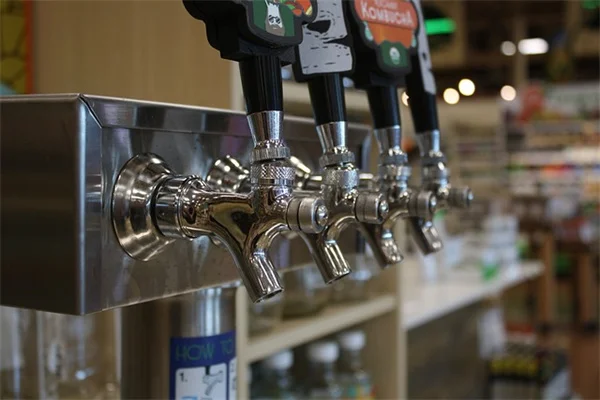TikTok's 'Budget Ozempic' Trend: Why Laxatives Won't Help You Lose Weight
Is TikTok's 'Budget Ozempic' trend actually helping people lose weight? The answer is a resounding no - and it's downright dangerous. We're seeing stores across America running out of laxatives because so many people are falling for this harmful trend. Here's the truth: while influencers claim products like Miralax work like Ozempic for weight loss, they're actually causing dehydration, nutrient deficiencies, and serious heart risks. As someone who's researched this extensively, I can tell you this is one trend you'll want to scroll right past. The temporary water weight you lose comes right back - but the damage to your body could last much longer.
Advertisement
- 1、The Dangerous TikTok Trend You Need to Know About
- 2、The Shocking Health Risks You Can't Ignore
- 3、Why Laxatives Fail at Weight Loss
- 4、Healthy Alternatives That Actually Work
- 5、The Social Media Trap We All Fall Into
- 6、The Psychology Behind Dangerous Trends
- 7、The Science of Sustainable Weight Loss
- 8、Building a Healthy Relationship With Food
- 9、Finding Support That Actually Helps
- 10、FAQs
The Dangerous TikTok Trend You Need to Know About
What's This "Budget Ozempic" Craze?
Have you seen those TikTok videos claiming laxatives are the new weight loss miracle? People are calling it "Budget Ozempic" - and it's causing real problems. Stores across America are running out of laxatives because so many folks are trying this dangerous trend.
Here's the scary truth: These influencers are promoting products like Miralax and Ex-Lax as quick weight loss solutions, saying they work just like Ozempic. But let me tell you, as someone who's researched this extensively, that's like comparing apples to oranges. Ozempic is a prescription medication for diabetes that happens to help with weight loss, while laxatives are, well... let's just say they're for a completely different bathroom situation.
Why This Trend Is Flooding the Market
The math seems simple to some people: Ozempic costs hundreds of dollars, while laxatives cost just a few bucks. But here's what they're not considering:
| Factor | Ozempic | Laxatives |
|---|---|---|
| Cost | $800-$1,000/month | $5-$20/month |
| Actual Weight Loss | Yes (fat loss) | No (water loss) |
| FDA Approved for Weight Loss | Yes | No |
See the difference? You might save money upfront with laxatives, but you're literally flushing your health down the toilet. And speaking of toilets, let's talk about what really happens when you misuse laxatives.
The Shocking Health Risks You Can't Ignore
 Photos provided by pixabay
Photos provided by pixabay
Immediate Problems You'll Notice
Within hours of taking laxatives for weight loss, your body starts sending distress signals. The first and most dangerous? Dehydration. Your large intestine normally reabsorbs water and nutrients - that's its job! But laxatives short-circuit this process.
Imagine your body is like a sponge. Normally, it soaks up what it needs before squeezing out the waste. Laxatives? They're like wringing out the sponge before it's had a chance to absorb anything. The result? You'll feel dizzy, tired, and about as energetic as a sloth on sleeping pills.
The Long-Term Damage You Won't See Coming
Now, here's a question that should make you pause: Did you know laxative abuse can literally stop your heart? It's true! When you lose too many electrolytes like potassium and magnesium (which laxatives flush out), your heart can start beating irregularly. In extreme cases, this leads to heart failure.
But that's not all. Over time, laxative misuse damages your gut lining, messes with your liver function, and can even prevent your body from absorbing nutrients properly. You might think you're losing weight, but you're actually starving your body of the vitamins and minerals it needs to function.
Why Laxatives Fail at Weight Loss
The Scale Is Lying to You
Here's the hard truth: when you step on the scale after using laxatives, that lower number is 100% water weight. Your body will replace this fluid as soon as you drink something - because dehydration can kill you, and your body knows this.
Think about it like squeezing water out of a towel. The towel gets lighter temporarily, but as soon as you dip it in water again, it regains that weight. That's exactly what's happening in your body when you misuse laxatives.
 Photos provided by pixabay
Photos provided by pixabay
Immediate Problems You'll Notice
Some TikTok "experts" claim laxatives help by reducing calorie absorption. Let me bust this myth wide open: food stays in your digestive tract for 24-48 hours. When you take a laxative today, you're mostly clearing out yesterday's meals, not the burger you just ate for lunch.
Here's a better question: Would you trust weight loss advice from someone whose main expertise is bathroom habits? Probably not. Yet that's exactly what's happening with this trend. Real weight loss comes from fat reduction, not from flushing your system.
Healthy Alternatives That Actually Work
Foods That Keep You Full and Healthy
Instead of reaching for laxatives, try these proven weight-loss helpers:
- Fiber-rich foods: Apples, oats, and broccoli keep you full longer
- Lean proteins: Chicken, fish, and Greek yogurt help maintain muscle
- Healthy fats: Avocados and nuts actually help regulate weight
I know what you're thinking - "But these don't work as fast!" You're right. They work better. Real weight loss isn't about quick fixes; it's about sustainable changes that keep you healthy for life.
Movement Matters More Than You Think
Here's something those TikTok videos won't tell you: regular movement does more for your weight than any quick fix. And I'm not talking about running marathons - even walking 30 minutes a day makes a huge difference.
When you're properly hydrated and nourished (unlike when you're abusing laxatives), you'll actually have the energy to move. That means more calories burned, more muscle maintained, and yes - real, lasting weight loss.
The Social Media Trap We All Fall Into
 Photos provided by pixabay
Photos provided by pixabay
Immediate Problems You'll Notice
Social media loves dramatic before-and-after stories. But here's what they don't show: the after-after photos when people regain the weight (or worse, end up in the hospital). These platforms are designed to grab attention, not give medical advice.
Remember: if something sounds too good to be true, it probably is. Especially when it comes from someone whose main qualification is having a smartphone and a ring light.
Building Real Habits That Last
The secret no influencer will tell you? Small, consistent changes create real results. Swap one soda for water each day. Take the stairs instead of the elevator. Add veggies to every meal. These tiny changes add up to big results over time - without risking your health.
At the end of the day, your body isn't a social media trend - it's the only one you've got. Treat it with the care and respect it deserves, and it will reward you with better health and sustainable weight management.
The Psychology Behind Dangerous Trends
Why We Fall for Quick Fixes
Ever wonder why smart people make dumb health choices? Our brains are wired to prefer immediate results over long-term benefits. When you see a TikTok video promising 10-pound weight loss in a week, your brain lights up like a Christmas tree. That's dopamine talking - the same chemical that makes slot machines so addictive.
I've been there too - scrolling through social media at 2 AM, convinced that if I just try this one weird trick, all my problems will disappear. But here's what I've learned: real change happens in the boring, everyday choices, not the viral hacks. The next time you're tempted by a quick fix, ask yourself: "Would I trust this person to perform surgery on me?" If the answer is no, maybe don't take medical advice from them either.
The Social Media Comparison Trap
You know that sinking feeling when you see someone's "perfect" body online? That's comparisonitis - and it's more dangerous than you think. Platforms like TikTok and Instagram show us carefully curated highlight reels, not the 3 AM fridge raids or bloated days we all experience.
Let me share something personal: my fitness journey looked nothing like those transformation videos. There were weeks when the scale didn't budge, days I ate an entire pizza (no regrets), and moments I wanted to quit. But that's normal! The people pushing these extreme solutions? They're often struggling just as much - they're just not showing you that part.
The Science of Sustainable Weight Loss
How Your Body Actually Burns Fat
Here's a fun fact that might surprise you: you breathe out most of your fat. When you lose weight, fat cells release triglycerides that break down into carbon dioxide (which you exhale) and water (which you pee or sweat out). That's right - your lungs are the real weight loss heroes!
This process takes time and proper nutrition. Unlike laxatives that just dehydrate you, real fat loss requires creating a calorie deficit through a combination of diet and exercise. Think of it like a campfire - you need the right fuel (food) and oxygen (exercise) to keep it burning steadily.
Why Crash Diets Always Fail
Remember the cabbage soup diet? The tapeworm diet? (Yes, that was a real thing). History is full of ridiculous weight loss fads that disappeared faster than donuts at a police station. Here's why they never work:
| Diet Type | Short-Term Results | Long-Term Success Rate |
|---|---|---|
| Crash Diets | Quick water weight loss | Less than 5% |
| Lifestyle Changes | Slower initial results | Over 60% |
Your body is smarter than any trend. When you drastically cut calories or abuse laxatives, your metabolism slows down to conserve energy. It's like your body saying, "I don't know when my next meal is coming, so I'm going to hold onto everything I can." That's why people often regain more weight than they lost.
Building a Healthy Relationship With Food
Listening to Your Body's Signals
When was the last time you ate just because you were hungry? For many of us, eating becomes automatic - we snack while watching TV, eat when stressed, or clean our plates out of habit. Learning to recognize true hunger is more powerful than any diet.
Try this experiment: next time you reach for food, pause for 10 seconds. Ask yourself: "Am I actually hungry, or am I bored/stressed/tired?" If you're not sure, drink a glass of water first. You'd be amazed how often we mistake thirst for hunger. This simple practice helped me break my late-night snacking habit - and it can work for you too.
The 80/20 Rule for Real Life
Here's a secret from nutritionists: perfection is the enemy of progress. Trying to eat "perfectly" all the time sets you up for failure. Instead, aim for 80% nutritious foods and 20% foods you enjoy. That means if you eat 20 meals a week, 4 of them can be whatever you want!
I used to beat myself up over every "bad" food choice until I realized - life's too short to never eat pizza again. The key is balance, not deprivation. When you stop viewing foods as "good" or "bad," you take away their power over you. Now that's real freedom!
Finding Support That Actually Helps
Choosing the Right Health Community
Not all support groups are created equal. Some fitness communities can become echo chambers for unhealthy behaviors. Look for groups that focus on:
- Progress over perfection
- Health markers beyond weight (energy, sleep, mood)
- Sustainable habits rather than quick fixes
I found my people in a hiking group that celebrates every small victory - whether it's completing a tough trail or just showing up. Find your tribe, and the journey becomes so much easier.
When to Seek Professional Help
If you're constantly thinking about weight loss or feeling guilty about food, it might be time to talk to someone. Registered dietitians, therapists, and doctors can provide personalized guidance without judgment. There's no shame in asking for help - in fact, it's one of the bravest things you can do.
Remember, your worth isn't measured by a number on a scale or a trend on TikTok. You deserve to feel good in your body - and that starts with treating it with kindness, not punishment. The next time you see a dangerous trend, ask yourself: "Is this helping me love myself more, or less?" The answer might surprise you.
E.g. :'Budget Ozempic': five ways this dangerous TikTok weight loss trend ...
FAQs
Q: What exactly is the 'Budget Ozempic' trend on TikTok?
A: The 'Budget Ozempic' trend is a dangerous social media craze where people are using over-the-counter laxatives like Miralax and Ex-Lax as cheap alternatives to prescription weight loss drugs. We've seen countless videos where influencers claim these products help shed pounds quickly by "flushing out" calories. But here's what they're not telling you: these laxatives were never meant for weight loss. They're designed for occasional constipation relief, not daily use. When you see someone promoting this trend, ask yourself: would you take car advice from someone who's never driven? That's essentially what's happening here with people giving medical advice without proper qualifications.
Q: Why are doctors so worried about laxative misuse for weight loss?
A: We're sounding the alarm because laxative abuse creates a perfect storm of health risks. First, it causes severe dehydration as your body loses vital fluids before they can be absorbed. Then comes the electrolyte imbalance - we're talking about critical minerals like potassium that keep your heart beating regularly. The scariest part? Many users don't realize the damage until it's too late. I've consulted with ER doctors who've treated patients for heart arrhythmias caused by this exact trend. Remember: just because something is sold over-the-counter doesn't mean it's safe for misuse.
Q: If laxatives don't cause real weight loss, why do people think they work?
A: Here's the illusion: when you step on the scale after laxative use, you might see a lower number. But we need to understand that's just water weight - not fat loss. Your body is about 60% water, so when you dehydrate yourself, the scale dips temporarily. But here's what TikTok videos don't show: that weight comes right back as soon as you drink fluids, because your body desperately needs hydration to survive. It's like squeezing water from a sponge - the sponge gets lighter temporarily, but returns to normal when wet again. Real weight loss comes from burning fat, not flushing fluids.
Q: What are some healthy alternatives to laxatives for weight management?
A: We recommend focusing on sustainable habits that actually work long-term. Start by adding more fiber to your meals - think fruits, vegetables, and whole grains that keep you full naturally. Protein is another secret weapon; foods like eggs, Greek yogurt, and lean meats help maintain muscle while keeping hunger at bay. And don't underestimate simple movement - even a daily walk can make a big difference. The key difference? These methods improve your health while helping weight management, rather than compromising it like laxatives do. Slow and steady really does win the race when it comes to healthy weight loss.
Q: How can I spot dangerous weight loss advice on social media?
A: We've developed a simple checklist to evaluate weight loss claims. First, beware of anything promising rapid results - real change takes time. Second, check credentials - is the person giving advice actually qualified? Third, look for red flags like "detox" or "flush out fat" - these are meaningless terms in real nutrition. Most importantly, ask yourself: does this seem too good to be true? If so, it probably is. When in doubt, consult a registered dietitian or doctor rather than taking health advice from random TikTok accounts. Your body deserves better than trending hashtags.




